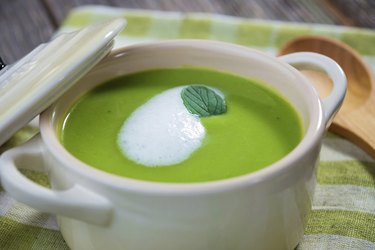
For a comforting starter or simple meal on a cool day, try a bowl of pea soup. You can buy it ready-to-eat or condensed, or make your own using any kind of peas, such as green peas or split peas. Pea soup is loaded with nutrition such as calcium, potassium and vitamin A. Pea soup provides several other benefits as part of an overall balanced diet.
High in Fiber
Video of the Day
A cup of split pea or green pea soup provides nearly 5 grams of dietary fiber, a cholesterol-lowering nutrient in many plant-based foods, according to the Harvard School of Public Health. Dietary fiber has a laxative effect and reduces your risk for constipation. Another benefit of a high-fiber diet is to promote blood sugar control and reduce your risk for type 2 diabetes. You should get 25 to 38 grams of dietary fiber per day, but the typical American gets less than half of the recommended amount, according to the 2010 Dietary Guidelines from the U.S. Department of Health and Human Services.
Video of the Day
Help with Weight Control
Obesity increases your risk for chronic diseases, such as arthritis and heart disease. You may be able to use pea soup to lose weight or prevent unwanted weight gain. A half-cup of canned, condensed split pea soup, which makes one cup after you dilute it, has about 180 calories. Limit your calorie intake by diluting your canned soup with water instead of whole milk, or make your own soup with broth as a base, not cream or milk. Make your soup chunkier and more satisfying by adding extra vegetables, such as carrots or squash.
Source of Minerals
Pea soup provides about 35 milligrams of magnesium per cup. This is about 9 percent of the daily value for this essential mineral for proper muscle function and blood pressure control. Peas are naturally rich in potassium, another mineral for regulating your blood pressure, and each cup may have more than 400 milligrams of potassium, or about 10 percent of the daily value. Pea soup has about 1.9 milligrams of iron, or 11 percent of the daily value, and iron promotes healthy red blood cells. Note that the exact nutritional values in each brand of pea soup may vary slightly.
Other Information
A diet high in legumes, such as beans, peas and lentils, may lower your risk for heart disease and diabetes, according to the Linus Pauling Institute Micronutrient Information Center. Pea soup can help you meet recommendations for a 2,000-calorie diet to get one and one-half cups per week, according to the 2010 Dietary Guidelines from the U.S. Department of Health and Human Services. A high-sodium diet can cause high blood pressure and increase your risk for heart disease and stroke, and soup is often high in sodium. To reduce the sodium from your soup, choose low-sodium canned pea soup, or make your own with low-sodium broth without adding much, if any, salt.